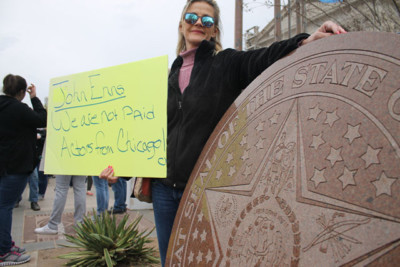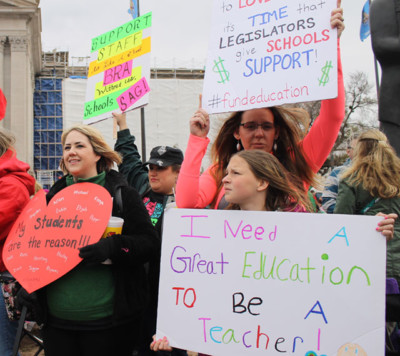
Support justice-driven, accurate and transparent news — make a quick donation to Truthout today!
Fed-up teachers in right-to-work states like Oklahoma, Kentucky and Arizona are continuing to press demands of their majority-Republican legislators who have slashed corporate tax rates over the years, shortchanging public education and other public services.
In a special Friday session, the Oklahoma State Legislature passed two bills teachers had been pushing as additional sources of revenue for education: HB 3375, or the “ball-and-dice” bill that will expand tribal gambling, and HB 1019XX, which requires Amazon and similar online retailers to collect state sales tax on items sold through their platforms from third-party vendors. The two bills raised an additional $44 million in funding for teachers and students in Oklahoma.
But schools in Oklahoma are closed again this week as more than 40,000 teachers, students and supporters — potentially the largest crowd yet — packed the Capitol again Monday to push for the last pieces of education revenue needed to meet their demands of $200 million for new annual education funding. Teachers are asking Republican Gov. Mary Fallin to veto a repeal of a $5-per-night hotel-and-motel tax that was part of the initial tax package passed by legislators in late March, and for lawmakers to pass a bill that would remove a capital gains exemption. Lawmakers discussed the capital gains bill Monday, which teachers say could raise $100 million in revenue.
“We need to invest that money that only goes to the super-wealthy and invest that in all of our citizens,” said Alicia Priest, president of the Oklahoma Education Association, outside the State Capitol building Thursday. “We’re really close to gaining all of [our] asks…. We need our legislature to understand that we can’t be in this same scenario next year or the year after. We can’t go back on cuts.”

Oklahoma’s teachers have the public’s ear. According to a survey taken from a Sooner Poll last Friday, 72.1 percent of respondents supported the walkout.
State legislators passed a tax increase package last month that originally provided about $450 million to teachers, school staff and state workers, raising the average teacher’s pay about $6,100. Governor Fallin signed the bill into law, making it teachers’ first raise since 2007. But the legislature’s hotel-motel tax repeal reduced the revenue raised by the tax package by about $45 million. The raise, however, was not enough to meet the Education Association’s demands, whose “Together We’re Stronger” plan asked for a $10,000 raise for teachers over three years, and a $5,000 raise for support staff.
About 200 of the state’s 584 school districts — including its three largest in Oklahoma City, Tulsa and Edmond — closed last week in recognition of the walkout. Sixty-six school districts, including Oklahoma City and Tulsa, closed Monday, with many expected to stay closed through Tuesday.
Governor Fallin came under further criticism from teachers after she compared them to a “teenage kid that wants a better car.” Teachers have decried her role in supporting tax cuts and granting subsidies for businesses in the erosion of state education funding.
“We need to invest that money that only goes to the super-wealthy and invest that in all of our citizens.”
Priest told Truthout that many supporters wanted her to use her leadership position as the president of the state’s largest teachers union to condemn officials for the comments they made. “Emotions are high and we don’t always use the best words, and so I’m going to allow some grace to our elected officials … to work through this process on their own and not respond to those kinds of comments.”
Teachers also decried comments from Education Secretary Betsy DeVos Monday, who criticized the walkout last week, telling the Dallas Morning News that she hopes “that adults would keep adult disagreements and disputes in a separate place, and serve the students that are there to be served.”
Prospect of Walkout Still Looms in Arizona
Teachers in Arizona again rallied at their own state capitol Monday, with about 800 teachers from the Dysart and Peoria school districts using time meant for professional development to instead chant happy birthday to Gov. Doug Ducey, who turned 54 Monday. They followed that by chanting, “What’s the plan, Ducey?”
Teachers there have also threatened a walkout unless they receive a 20 percent raise and additional revenue for schools. Last Monday, Governor Ducey indicated that move wasn’t likely, raising the stakes for a similar standoff between teachers and politicians.
The Arizona Education Association (AEA) and Arizona Educators United, the primary groups organizing protests over education funding, sent a letter to Governor Ducey asking for a sit-down meeting to negotiate over teachers’ demands, which also include raises for support staff and for school funding to be restored to pre-Recession 2008 levels, alongside a halt on any new tax cuts.
AEA President Joe Thomas, who has taught for 17 years in Arizona, told Truthout teachers there are continuing protests this week, with statewide school “walk-ins” planned Wednesday in which teachers and support staff will rally before their schools’ first bell, walking in together and wearing “red for ed” as part of the state’s campaign for education funding. Hundreds of other local protests are also expected to continue as educators wait to see whether “the governor steps up and decides he wants to start talking to teachers and educators, and move to fix the crisis that we’re facing,” Thomas said.
“This will be a pretty massive movement once it takes shape as a statewide action.”
He told Truthout teachers will strike if the legislature does not end with a budget that meets teachers’ demands for education funding. “For 10 years, teachers have made phone calls. They’ve emailed. They’ve had face-to-face conversations with their legislators, and we’ve not seen the needle move on this. When you’ve done all that, and you see in West Virginia and Oklahoma and Kentucky that it looks like the only thing elected officials will respond to is a walkout, then teachers are going to walk out,” Thomas told Truthout.

West Virginia teachers led a nine-day strike that resulted in a 5 percent raise in March, galvanizing teachers in other red states to take similar action. Thomas described Arizona’s unions and independent protest groups as strongly united and emboldened by teachers’ actions in West Virginia, Oklahoma and Kentucky, saying that, “This will be a pretty massive movement once it takes shape as a statewide action.”
He said that while he believes the governor is feeling the pressure from teachers and is likely to raise education funding somewhat this year, he has “little faith that the governor has the political courage to meet the demands educators have laid out in way that will end our teaching crisis.” Governor Ducey has so far offered a 1 percent salary increase above the 1 percent offered to teachers last year.
Both Thomas and his wife, who is also an educator, have had to work a second job at various times as well as teach summer school to make ends meet while raising their three children.
Further, he emphasized that Arizona, like Oklahoma, faces a crisis in which 10 percent of the state’s workforce is substitute or “emergency-certified” — teachers who bypass normal training requirements and lack the skills necessary to meet the complex needs of students.
Kentucky Teachers Contemplate Next Moves as Governor Vetoes Budget Bill
Many of Kentucky’s teachers are back to their classrooms this week after the state’s largest teachers union, the Kentucky Education Association (KEA), called on educators to return to class and continue their “advocacy back home by speaking directly with your elected senators and representatives.”
After Kentucky teachers’ walkout last Monday, the legislature passed a new state budget that increases education funding, restoring $254 million for school transportation as well as previously eliminated funding for a statewide program that provides support for students dealing with emotional and social issues. The budget also guarantees teachers who retired after 2010 health insurance if they don’t qualify for Medicare. But the legislature also passed a sweeping tax overhaul last week that cuts taxes for corporations and the wealthy while raising them on 95 percent of the state residents.
Republican Gov. Matt Bevin vetoed the budget bill and the tax overhaul Monday over the demands of educators to spare the education-funding components of the budget. Lawmakers have until midnight Saturday to overturn Governor Bevin’s vetoes.
At least one Jefferson County union has called on teachers to use any availalbe personal days this Friday to protest again at the capitol in Frankfurt. The KEA has not indicated whether it would support a walkout, which Governor Bevin told reporters Monday “would be illegal.” Further, Governor Bevin told reporters that, “The KEA has been a problem.”
KEA President Stephanie Winkler responded in a statement, writing, “We are disappointed as well by the governor’s reference to KEA as ‘the problem.’ KEA is 45,000 women and men who serve in every community in Kentucky, supporting and training our children for the jobs they will do when they take their places in the adult world. KEA members live, work and pay taxes in every community in this state. If the governor wants to work with ‘job creators and taxpayers,’ why does he insist on insulting so many people who do both?”
While the KEA characterized the vetoed bills as less than perfect, the organization called on the governor to sign them “instead of sending the legislature back to square one and forcing a special session that the citizens of Kentucky should not have to pay for.”
Teachers called in sick or requested substitutes in late March in protest over Kentucky lawmakers’ passage of a pension reform bill, resulting in the closure of schools in more than 20 counties. The state’s educators rallied in Frankfort last Monday, marching to the State Capitol to protest the overhaul of the state’s pension system, and to press for additional education funding.
The pension bill moves future teacher hires to a “hybrid” plan that does not offer a set pension. The plan consists of individual retirement accounts in which the state would keep 15 percent of any investment gains. The bill would also not protect them from future benefit changes.

Kentucky Attorney General Andy Beshear has threatened to sue over the pension bill’s implementation if Governor Bevin signs it into law. The KEA has said it will join the suit if it moves forward.
The state’s teachers are also eyeing an electoral strategy as their legislative session winds down. This November marks the state’s first election since Republicans took control of the legislature, with all 100 House seats and half the state Senate seats up for grabs. Dozens of current and former educators are running for legislative seats not only in Kentucky but also in Oklahoma and Arizona.
Sustained tax cuts in West Virginia, Oklahoma, Arizona and Kentucky have paved the way for chronic underfunding of the states’ schools over the past decade. In 2015, 29 states provided less education funding per student than in 2008, according to a 2017 Center on Budget and Policy Priorities report. Local funding has also taken a hit, dropping dramatically from 2008 levels across the nation.
Media that fights fascism
Truthout is funded almost entirely by readers — that’s why we can speak truth to power and cut against the mainstream narrative. But independent journalists at Truthout face mounting political repression under Trump.
We rely on your support to survive McCarthyist censorship. Please make a tax-deductible one-time or monthly donation.